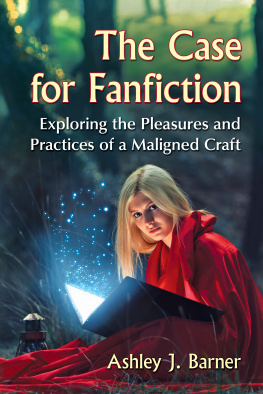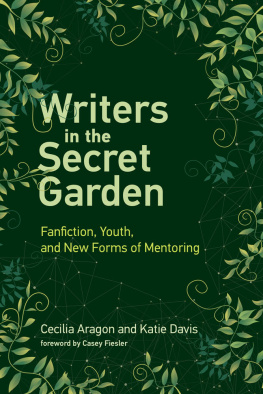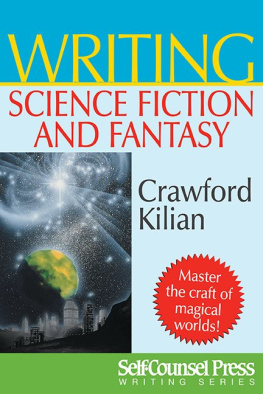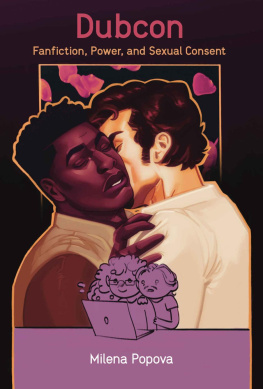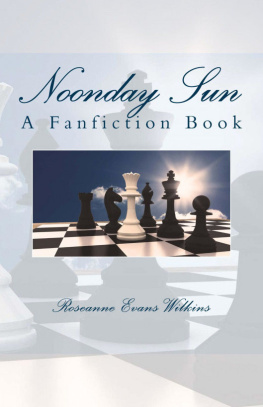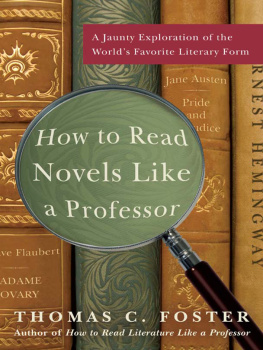
The Case for Fanfiction
Exploring the Pleasures and Practices of a Maligned Craft
ASHLEY J. BARNER

McFarland & Company, Inc., Publishers
Jefferson, North Carolina
LIBRARY OF CONGRESS CATALOGUING DATA ARE AVAILABLE
BRITISH LIBRARY CATALOGUING DATA ARE AVAILABLE
e-ISBN: 978-1-4766-3103-5
2017 Ashley J. Barner. All rights reserved
No part of this book may be reproduced or transmitted in any form or by any means, electronic or mechanical, including photocopying or recording, or by any information storage and retrieval system, without permission in writing from the publisher.
Front cover image 2017 iStock
McFarland & Company, Inc., Publishers
Box 611, Jefferson, North Carolina 28640
www.mcfarlandpub.com
To all the great friends, online and IRL,
who have squeed with me over our favorite fandoms
Acknowledgments
I would like to express my sincere gratitude to Dr. Marsha L. Dutton for all the time she spent working directly with me to revise my dissertationthe original version of this bookin preparation for my defense, and for encouraging me to send it to publishers. Without her, this book would never have seen the light of day. I would also like to thank the rest of my dissertation committeeDr. Thomas Dancer, Dr. Robert Miklitsch, and Dr. Katherine Jellisonfor the way they challenged and expanded my thinking.
My sincere thanks also goes to Dr. Matthew Kinservik and Dr. Linda Zionkowski for the way they encouraged me to write about what interested me, and the time they invested in helping me to do so.
Finally, I thank my family and friends for all their encouragement and support, and all the fans whose work has inspired me.
Introduction
On a popular culture website, writer Shana Mlawki makes what she calls an embarrassing admission about a personal habit, one that she still engages in. But only sometimes! she quickly adds. Once or twice a yearat most, I swear!I indulge in what I admit is a very guilty pleasure.
What bad habit could possibly require so much apology? Is she taking illegal drugs? Binge eating? Frequenting strip clubs?
No, the bad habit Mlawki is admitting to is a habit of a very different kind: she reads fanfiction.
Fanfiction is a genre in which fans write new stories about other writers characters, from Mr. Spock and Elizabeth Bennet to Robin Hood and Odysseus. This sounds innocuous enough: what makes it a guilty pleasure? In fact, how did the enjoyment of any genre, short of enthusiastically affirmative readings of works like Mein Kampf or Lolita, come to be so tinged with guilt? Why do fanfiction readers like Mlawki feel the need to defend themselves from attack by assuring their audience how rarely they partake of a genre they enjoy?
This book examines why reading fanfiction is considered such a guilty pleasure. Yes, fanfiction is mostly written by amateur writers, without the benefit of professional editors. It might be full of spelling errors and grammatical mistakes, but thats not enough of a reason for writers like journalist Ewan Morrison to observe, For many the rise of fanfic is the end of the world. Fanfic is seen as the lowest point weve reached in the history of cultureits crass, sycophantic, celebrity-obsessed, nave, badly written, derivative, consumerist, unoriginalanti-original. Where is all this vitriol coming from? The answer is complicated, involving an entire network of cultural assumptions about reading, age, gender, literary quality, intellectual property, originality, and profit, and this book attempts to explain how these elements connect to produce negative reactions to fanfiction. It also examines what the effects of these negative reactions are on fanfiction as a genre.
Chapter 1, Nouseled in Books, offers a description of a practice that I call absorbed reading, in which the reader feels that he or she has entered into the world of the book. Because absorbed reading gives characters a seeming reality, this reading/viewing technique can lead to the creation of fanfiction and even makes fanfiction possible in the first place. Absorbed reading is a very old practice, and while readers often attribute many beneficial effects to it, there is also a long history of criticisms connected with it. For at least five hundred years, critics have feared the effects of absorbed reading on supposedly mentally vulnerable readers such as young people and women. These criticisms are still alive and well today, and not only target the young and female but emotionally invested readers and readers of genres that are considered to be of poor literary quality. Fans and creators of fanfiction frequently fall into all of these categories, so fans reading and the fanfiction they produce comes under fire for their connection with absorbed reading.
One prominent area where criticisms of absorbed reading collide with fanfiction is in the case of Mary Sues. Chapter 2, Getting Above Themselves, explains how this complicated fanfiction character type, associated with idealization and self-insertion into the text, actually functions as a metaphor for absorbed reading. Mary Sue characters are inserted into fictional worlds as placeholders for the absorbed readers/writers, allowing them to imaginatively experience the setting, form reciprocal relationships with fictional characters, become heroes, and affect the plot of the story directly. The term Mary Sue, though it could be applied to characters across many genres, arose from the fan community and is particularly associated with fanfiction. The hatred that fans often pour out on Mary Sue characters derives from the concept of bovarysme: the fear that less powerful members of society, such as women and young people, will learn from fiction to view their lives as myth and themselves as fictional heroes. This idea of bovarysme is sexist: while the practice is condemned in female characters like Mary Sues, it is traditionally expected from male characters, and may be connected to the lack of important, fully realized female characters in modern and traditional media.
Chapter 3, Story Sue-icide, demonstrates the effect criticisms of bovarysme have on fanfictions. The chapter analyzes two fanfictions with Mary Sue premises that attempt to distance themselves from the bovaryste idea of the Mary Sue. Dont Panic!, a Lord of the Rings fanfiction by Boz4pm, immediately sets Mary Sues and their connection with pleasure reading and changes to the canon in opposition to realism. In order to counter the Mary Sue stereotype, the fanfiction puts the female main character through an emotional hell and forbids her from altering the story of TheLord of the Rings. In doing so, the fanfiction accidentally negates its own concept of pleasure reading as an escape from reality and calls into question the very changes to the canon that are the basis of fanfiction.
Likewise, the fanfiction miniseries Lost in Austen is torn between gently mocking Austen fans, who are the main audience of the series, and celebrating their escapist reading of romance novels. This series sets itself up to discuss both historical and modern ideas of how such escapist reading could ruin womens lives by giving them a false idea of their own importance and raising their standards for men to impossibly high levels. The series attempts to praise such absorbed reading for leading women to pursue true happiness in life, but cannot seem to break free of societys negative stereotypes about womens self-indulgent reading of romances.
Next page
